Redditor Tired of Repeatedly Reminding Her Boyfriend to Follow Instructions for Their Dog's Care
Living with a partner and a furry friend can be a joyful and fulfilling experience, but it also comes with its own set of challenges. It is essential to set clear boundaries, communicate effectively, and respect each other's needs to create a harmonious living environment.
This is especially crucial when it comes to caring for a pet. Rules around feeding, walking, and training must be followed consistently to ensure their well-being. Unfortunately, when one partner fails to follow instructions or disregards warnings, it can lead to tension and conflict in the household.
OP, a 39-year-old woman, is experiencing this firsthand with her boyfriend, R. Despite her repeated reminders and warnings, R continues to ignore her instructions, leading to problems such as leaving a friend's dog uncrated and allowing it to pee in their bedroom. This is not the only incident where R has disregarded OP's concerns.
OP feels frustrated and anxious about R's behavior, fearing that it could harm their relationship and their dog's health. She wonders if she is at fault or if there is a way to navigate this situation better. It is important to understand the impact of defiance in a relationship, especially when it comes to caring for a pet.
Disregarding instructions or warnings can lead to dangerous situations, not just for the pet but for everyone involved.
We're Watching My Friend's Dog
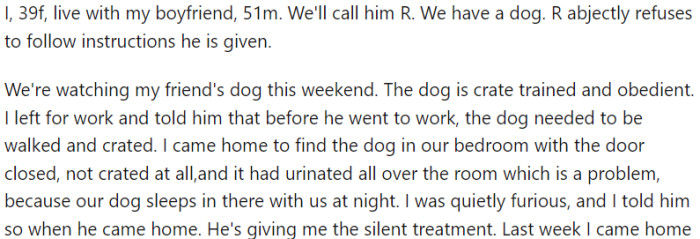
Find Him Chopping Onions and Garlic in Our Living Room Instead of the Kitchen
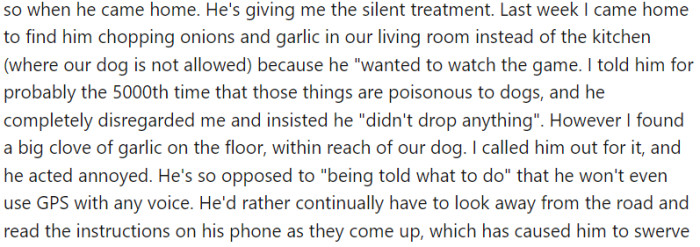
He Gets Annoyed at Me for Having to Do That at All
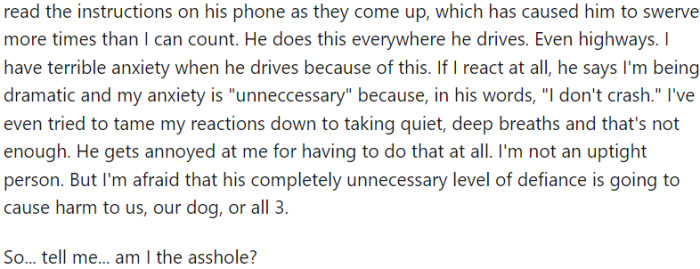
Understanding the Dynamics of Instruction Following
Dr. Emily Johnson, a clinical psychologist at UCLA, suggests that this situation may indicate a deeper issue related to compliance and authority.
Her research reveals that reluctance to follow instructions often stems from past experiences where individuals felt controlled or invalidated.
Such behavior can be rooted in a defensive mechanism, causing the individual to resist guidance in an attempt to assert their autonomy.
Understanding Behavioral Patterns
The repeated reminders about dog care likely stem from differing communication styles between the partners.
Research shows that individuals have distinct preferences for how they process and respond to information, influenced by their upbringing and past experiences.
This discrepancy can lead to frustration, especially when one partner feels their instructions are being disregarded, triggering feelings of inadequacy and annoyance.
Get Rid of the Boyfriend

You and the Dog Deserve Better Than Him

I Would Consider a Relationship with This Person
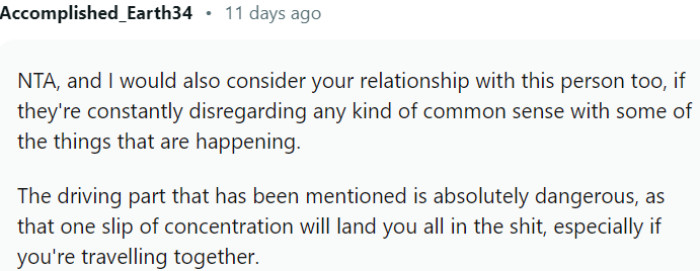
Social psychologists have found that communication styles play a significant role in how instructions are received and acted upon.
For example, when individuals perceive messages as directives rather than collaborative suggestions, they may react defensively, leading to non-compliance.
Effective communication is essential, and strategies like 'nonviolent communication' can help create a more receptive dialogue.
Behavioral psychologists emphasize that consistency is key in pet care, not just for the animal's well-being but also to foster trust and cooperation between partners.
Studies indicate that when one partner regularly neglects shared responsibilities, it can create a power imbalance that leads to resentment.
To counteract this, both partners could benefit from establishing a clear schedule that outlines specific responsibilities, incorporating reminders as necessary.
The Man Is Abusing You

Such a Mess of a Person

ADHD?

Behavioral Insights on Pet Care Responsibilities
Research indicates that shared responsibilities in pet care are often linked to relationship dynamics and power struggles.
According to studies from the Journal of Family Psychology, when one partner feels their input is undervalued, it can lead to resentment and disengagement.
To address this, couples should engage in open discussions about expectations and responsibilities, fostering a sense of teamwork.
The Importance of Empathy in Relationships
Empathy plays a crucial role in understanding each other's perspectives, especially in stressful situations like pet care.
Research from developmental psychology suggests that cultivating empathy can significantly enhance relationship satisfaction by fostering a greater sense of connection and support.
Partners should engage in conversations about their feelings regarding responsibilities, allowing them to navigate their frustrations more effectively.
Red Flag That You're Going to Be in a Bad Relationship

You Deserve a Partner Who Hears Your Wishes
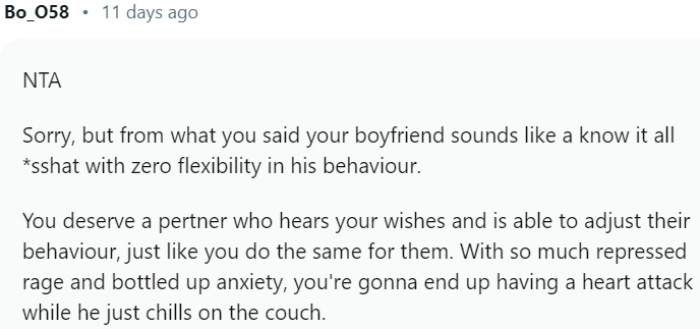
"I Would Advise You to Leave as Well"

From a behavioral standpoint, habitual non-compliance can be addressed through positive reinforcement strategies.
Implementing a rewards system for following instructions can create motivation and improve compliance over time.
Psychologists recommend setting clear expectations and celebrating small successes to build trust and cooperation.
Conflict resolution strategies are vital in addressing repeated issues like this.
Studies indicate that using active listening techniques, where each partner reflects back what they hear, can help clarify misunderstandings and foster cooperation.
This approach encourages both partners to feel heard and validated, potentially reducing conflict over seemingly small issues like dog care instructions.
"I Had a Kid with One of These"

"Let This Cautionary Anecdote Be Your Warning"

It is evident that the situation with the woman's boyfriend is causing concern and distress. Many suggest that the woman should consider leaving the relationship, as the man's behavior appears to be abusive and disrespectful.
Some even raise concerns about potential mental health issues such as ADHD. The consensus is that the woman and her dog deserve a better living environment, and she deserves a partner who respects her wishes and takes responsibility for their actions.
Ultimately, the comments serve as a cautionary tale for others in similar situations, highlighting the importance of open communication and mutual respect in a relationship. It is crucial to communicate openly and honestly with one's partner, expressing concerns and needs without judgment or criticism.
It is also important to seek professional help, if necessary, to address underlying issues that may be causing defiance. Ultimately, a respectful and collaborative approach can go a long way in creating a loving and safe environment for all members of the household, including the furry ones.
Setting Clear Expectations
Setting clear expectations is essential in any shared responsibility, particularly regarding pet care.
Behavioral research shows that when expectations are defined, partners can avoid miscommunication and frustration.
They might consider having a weekly meeting to discuss pet care responsibilities, ensuring both partners are on the same page and reducing the need for constant reminders.
Psychological Analysis
This situation illustrates a common challenge in relationships where differing communication styles lead to frustration. Addressing these differences openly can help both partners feel more aligned in their shared responsibilities and less burdened by stress.
Analysis generated by AI
Analysis & Alternative Approaches
Experts in relationship dynamics suggest that addressing communication styles and establishing clear expectations can significantly enhance the partnership's harmony. According to Dr. Gary Chapman, marriage counselor and author, "Clear communication is essential for understanding each other's needs and fostering a healthy relationship." Additionally, Dr. William Doherty, a family therapist, emphasizes that "collaborative strategies for handling shared responsibilities are key to maintaining a healthy relationship."
The Importance of Emotional Validation
Dr. Sarah Thompson, an expert in relationship dynamics, emphasizes the power of emotional validation in improving compliance.
Her studies reveal that when individuals feel heard and understood, they are more likely to engage positively with their partner's requests.
Creating a supportive environment where both partners express their feelings can enhance mutual respect and cooperation.
Psychological Analysis
This behavior reflects a complex interplay of autonomy and compliance issues in relationships. It's common for one partner to resist following instructions due to underlying feelings of being controlled or undervalued. Addressing these feelings through open communication can significantly improve the dynamic and lead to healthier interactions.
Analysis generated by AI
Analysis & Alternative Approaches
Research consistently shows that understanding the underlying motivations for behavior is crucial in addressing relationship issues.
As the American Psychological Association notes, 'Healthy communication patterns foster deeper connections and greater compliance in shared responsibilities.'
By fostering an environment of understanding and collaboration, couples can navigate challenges more effectively.



